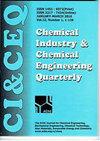Numerical simulation of the oscillating thin plate impact on nanofluids flow in channel
IF 0.8
4区 工程技术
Q4 CHEMISTRY, APPLIED
Chemical Industry & Chemical Engineering Quarterly
Pub Date : 2023-01-01
DOI:10.2298/ciceq230401017j
引用次数: 0
Abstract
The present numerical study aims to present the effect of using a titled oscillating thin plate with different angles of inclination on the Al2O3-water nanofluid flow and heat transfer performance. The subsequent work establishes methods for forming fluid-structure interactions by impact of Al2O3-water nanofluid at 0.1-1.0 vol. % volume fraction upon the thin plate using COMSOL Multiphysics 5.4. The turbulent model is solved using the (k-?) model and the assembly of the flow around the thin plate obstacle has been confirmed at Reynolds number of Re=4?104. It exemplifies how Nanofluid flow interaction can distort structures. The current study donates to the study of the turbulent, two-dimensional, stationary and incompressible flow around an oscillating thin plate that has inclined angles with upstream and downstream that mounted inside a horizontal channel. The numerical study includes investigation the effect of five inclination angles of the thin plate as (30, 60, 90, 120 and 150?) on the pressure, velocity, and temperatures contours of the Al2O3-water nanofluid. Also, the study presented the profile of the drag and left force of the thin plate that causing by the fluid flow. The results showed that the occurrence of a titled oscillating thin plate inside the flow direction leads to an increase pressure drop, von mises deformation stress, x-displacement and drag force fields and the Nusselt number. Where the pressure increased from 2.61?103 to 6.21?103 pa, the von mises stress increased from 4.43?106 to 1.78?107 N/m, and the X-displacement increased from 1.6 to 5.5 mm when increasing the plate angle from 30 to 90?.振荡薄板冲击通道内纳米流体流动的数值模拟
本文旨在研究不同倾斜角度的振荡薄板对al2o3 -水纳米流体流动和传热性能的影响。随后的工作利用COMSOL Multiphysics 5.4建立了通过0.1-1.0 vol. %体积分数的al2o3 -水纳米流体冲击薄板形成流固相互作用的方法。采用(k-?)模型求解了紊流模型,确定了雷诺数Re=4?104时薄板障碍物周围流动的集合。它举例说明了纳米流体相互作用如何扭曲结构。目前的研究有助于研究湍流、二维、静止和不可压缩的流动,这些流动围绕一个与上游和下游有倾斜角的振荡薄板,安装在一个水平通道内。数值研究了不同倾角(30度、60度、90度、120度和150度)对氧化铝-水纳米流体压力、速度和温度分布的影响。研究了流体流动对薄板的阻力和左力的影响。结果表明:流动方向内出现有标题的振荡薄板,导致压降、von mises变形应力、x-位移力场和阻力力场以及努塞尔数增大;压强从2.61增加到哪里?103到6.21?103pa时,von mises应力从4.43?106到1.78?当板角从30°增加到90°时,x -位移从1.6 mm增加到5.5 mm。
本文章由计算机程序翻译,如有差异,请以英文原文为准。
求助全文
约1分钟内获得全文
求助全文
来源期刊

Chemical Industry & Chemical Engineering Quarterly
CHEMISTRY, APPLIED-ENGINEERING, CHEMICAL
CiteScore
2.10
自引率
0.00%
发文量
24
审稿时长
3.3 months
期刊介绍:
The Journal invites contributions to the following two main areas:
• Applied Chemistry dealing with the application of basic chemical sciences to industry
• Chemical Engineering dealing with the chemical and biochemical conversion of raw materials into different products as well as the design and operation of plants and equipment.
The Journal welcomes contributions focused on:
Chemical and Biochemical Engineering [...]
Process Systems Engineering[...]
Environmental Chemical and Process Engineering[...]
Materials Synthesis and Processing[...]
Food and Bioproducts Processing[...]
Process Technology[...]
 求助内容:
求助内容: 应助结果提醒方式:
应助结果提醒方式:


